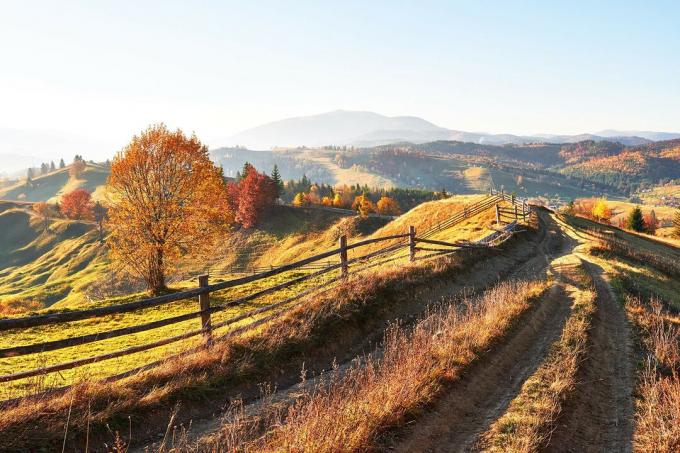
In September summer slowly comes to an end. Meteorologically speaking, it ends on the 31st. August and starts on the 22nd. or 23. September. The weather can be calm but also turbulent. Here you can find out all the farming rules for September.
To the point
- Peasant rules are based on observations of people in ancient times
- they tried to interpret the interaction between nature and weather
- Afterwards, the agricultural work was carried out
- According to farmers' rules, the weather in September should provide information about autumn and winter
Table of contents
- Mostly warm in summer
- Sunny to clear
- Storm & rain
- Cold & snow
- General wisdom
- frequently asked Questions
Mostly warm in summer
The first month of autumn is usually still warm and summery, but in some cases the weather is slightly unsettled. In the middle of the month and into October, Indian summer brings back a few warm, sunny days. These herald the farewell to the warm season. This is usually followed by cold and wet autumn days. Since ancient times, people have tried to recognize the interaction between nature and weather. So give different
Peasant rules and wisdom for September, information about the coming weather and working in the garden. Below are some of them.
Notice: If on the 22nd or 23. September, when days and nights are of equal length (equinox), is the beginning of autumn in the northern hemisphere and the beginning of spring in the southern hemisphere.
Sunny to clear
“If Michel comes cheerful and beautiful, it will continue like this for four weeks.”
The church celebrates on the 29th. September is a festival in honor of St. Michael the Archangel, leader of the heavenly hosts and conqueror of the devil. According to this one Pawn rule The warm, summery day in September is followed by another four weeks of Indian summer. There were also various observations back then, as the next statement confirms:
“Give Michael (29. September) sunshine, will be winter in two weeks.”
With such different statements, it is not possible to make a reliable forecast.
“If Saint Regina is sunny for a long time, the weather stays sunny for a long time.”
Saint Regina was born in France around 271. She was an early Christian martyr. On the 7th September is her memorial day.
“If it doesn’t rain on Protus, we can hope for a dry autumn.”
The 11th September is the day of remembrance for the early Christian martyr Protus. He came second to him. Century victims of Christian persecution. According to this, there is no rain on this day in September Pawn rule a dry autumn is expected.
“If it is beautiful at St. Gorgon, you will see forty beautiful days.”
On the 9th September is the day of remembrance for the early Christian martyr, Saint Gorgonius of Rome. Around 305 he became a victim of the persecution of Christians.
“Bright and clear on St. Lambert, a dry year follows.”
Lambert of Liège was a bishop and a martyr. The anniversary of his death was on the 17th. September became a memorial day.

“If September is mild, winter will be a child.”
A warm September is followed by a winter that is too mild.
“September beautiful in the first few days means the whole of autumn.”
“September weather warm and clear, bodes well for next year.”
“Warm, dry September moon rewarded with plenty of fruit.”
Storm & rain
“When Aegidius blows the horn, it is said that the farmer sows his grain.”
On the 1st September is the day of remembrance of St. Giles. He lived in the 7th century. Century and was one of the fourteen emergency helpers.
“When Matthew cries instead of laughing, he makes vinegar out of the wine.”
“The farmer likes the fine September rain.”
It is a good time for sowing lamb's lettuce, garlic and spinach. Afterwards, the soil must be evenly moist.

“Bring St. Gorgon (9. September) rain, followed by an autumn with few blessings.”
On the 21st St. Matthew's Day is celebrated in September. He was one of the twelve apostles, envoys or messengers of Jesus. These were chosen by Jesus to preach the gospel. In ancient church tradition, Matthew is named as the author of this gospel. If it rains that day, it will affect the quality of the wine to be harvested.
“Saint Ludmilla, the pious child. likes to bring rain and wind.”
The 15th September is the memorial day for Saint Ludmilla of Bohemia, the country's first princess. She campaigned for Christianization.
“If it fogs on Cleophas, the whole winter will be wet:”
Cleophas met the resurrected Jesus on the road to Emmaus. The 25th September is his memorial day.
“If Matthew enters stormy, it will be winter until Easter.”
“After September thunderstorms, you will be shivering with snow and cold in February.”
“If it is still thundering in September, the snow will still be deep in March.”
“If September can still thunder, the trees will put on lots of flowers.”
“If there is thunder in September, there will be a lot of plums next year.”
“It rains gently on Michael’s Day (29. September), a gentle winter may come. But if the wind blows cold, then a harsh winter will come.”
“September rain, the farmer’s blessing, the winemaker’s poison when it hits him.”
“September fog brings rain when it is rising, but clear weather when it is falling.”
“If September is rich in rain, the water blesses the seeds.”
Cold & snow
“When the spiders crawl in September, they can smell winter.”
If the canopy spider can be observed more frequently during the Indian summer, it won't be long until winter. All preparations should then be made for the approaching cold season.

“If it is light on the day of the Exaltation of the Cross, a harsh winter follows.”
The Day of the Exaltation of the Cross is celebrated as a festival by the Roman Catholic Church on December 14th. celebrated in September. According to the Gospel, on this day Jesus announced to his disciples that he would die on the cross.
“September warmth now and then indicates a severe winter.”
“In September the pears are firmly on the stalk, the winter brings a lot of cold.”
“Lots of acorns in September, lots of snow in December.”
“A lot of blackthorn in September, a lot of snow in the winter.”
The blue, round and tart-tasting fruits of the sloes ripen in September.
Tip: You can make a delicious liqueur from this: wash 200 g of ripe sloes and put them in a bottle. Add 150 g of white rock candy and a split vanilla pod. Then fill with 700 ml of clear schnapps and cork well. Let everything steep for two months.
General wisdom
“September is rough in the evenings, but brings a lot of dew in the mornings.”
“Pay attention to Aegidius (September 1st), he tells you what the month does.”
“Whoever gives grain to St. Giles (1. “September) sows, next year we cut off a lot of fruit.”
“On the birth of Mary (8. September), it is neither too early nor too late.”
“If it doesn’t rain on the Nativity of Mary (September 8th), the farmer’s table will remain blessed.”
“Like the weather on Magnus Day, it may stay for four weeks.”
The 6th September is the memorial day for Saint Magnus of Füssen (8. Century). He was an emergency helper against vermin and is called in to prevent destruction. The day is also known as erosion day. If September begins with a lot of rain, a wet September will follow in two out of three subsequent years. If the beginning of the month is clear, more high pressure areas will follow.

“On the day of Mary’s birth the swallows ford. But if they stay there, winter is not yet close.”
On the 8th A festival in September commemorates the birth of Mary, mother of Jesus Christ. The farmer's calendar uses the day to indicate the coming beginning of autumn. The swallows are now moving to their winter quarters in Africa.
“In the name of Mary, summer says Amen.”
The Roman Catholic Church celebrates it on the 12th. The Feast of the Name of Mary is celebrated in September. Its origin goes back to a feast day for the saint named Mary in 1513. At the same time, this day in the farmers' calendar marks the end of summer. In earlier times, from this day on, poor people were allowed to pick up grain left behind from the harvested fields.
“The winter crops will thrive if they are sown until Matthew.”
Sowing until the 21st. September brings a good harvest next year.
“As Matthew goes, the weather stays for four weeks.”
The weather on the 21st September provides information about the weather for the next four weeks.
“If Matthew enters, the sowing must be finished.”
Until the 21st All sowing should be done by September.
“To Tobias, I know that the nuts taste good.”
Tobias is considered the patron of travelers, pilgrims and those with eyesight. His memorial day is the 13th. September.

“If Hiltrud is on the calendar, the grass will be mowed again.”
Hiltrud von Lissies came from a French noble family. She lived in asceticism in a monastery. The 27th September is St. Hiltrud's memorial day.
Tip: In September, the meadow in the garden must be mown again and compost must be applied to all harvested beds and green manure must be sown.
“The acorns fall before St. Michael (29. September), summer goes to the grave early.”
frequently asked Questions
The name comes from the presence of cobwebs in sunny autumn meadows, in bushes, forest edges and between autumn bloomers. Since the days are still warm but the nights are colder, the cobwebs are covered with dew in the morning. In the sunlight, the individual spider threads shine like long, silver-colored hair. Indian summer first took place at the beginning of the 19th century. century mention.
Since ancient times, people, mainly farmers, have drawn conclusions about the coming weather and the associated agricultural work from their observations about the weather. This is usually a medium-term forecast. These pieces of wisdom are mostly written in rhyme and have been passed down from generation to generation.
They do not always correspond today to the observations from back then. It must be noted that the weather in the different regions is very different. The application is therefore not possible across the board in every location. Added to this is the constant climate change. Due to global warming, many farming rules are no longer applicable today.
